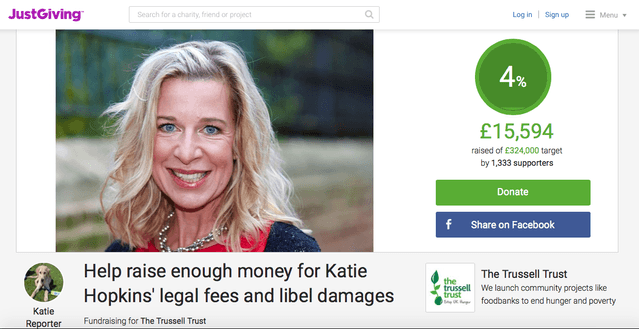Want to fight hatred and raise money for a good cause? Do it the fun way!
- Exhibited by
- John Logan
- Added
- May 04, 2017
- Medium of Communication
- Target Audience
- Type of Charity
- Country of Origin
- Date of first appearance
SOFII’s view
We love a bit of humour here at SOFII and this campaign has it by the spade-full. What a clever and cheeky way of winding up notorious British hate-monger Katie Hopkins and doing a bit of good in the process. It also throws up some interesting ethical questions as well as showcasing how social media sites and online platforms can be used to raise substantial amounts of money.
Summary / objectives
An online campaign via JustGiving appeared at first glance to be a dubious and unpopular ask for donations for a controversial recipient. But it was in fact a clickbait spoof and genuinely raised money for the Trussell Trust foodbanks – surprising the campaign creator who began the idea as a joke.
Background
For non-UK readers, here’s a bit of background. Katie Hopkins is a former reality show contestant and a highly controversial tabloid columnist and broadcaster whose extreme views often offend and divide opinion. She has in the past compared refugees to cockroaches and often uses Twitter to communicate in a sharp, insulting and provocative tone. In March 2017 she lost a High Court battle over her libellous tweets to UK food blogger and poverty awareness campaigner Jack Monroe and was faced with court costs of over £300,000. Hopkins had falsely accused Monroe of supporting vandalism of war memorials.
A satirical online news site, the Southend News Network, created a page on JustGiving.com which at first glance looked like a fundraising plea to help Katie Hopkins pay her legal fees. By presenting her as a personal ‘charity case’ it was perfect online clickbait – although after reading the full text on the JustGiving page it was revealed that it was just an elaborate joke and any money raised would in fact be given to the Trussell Trust – a food bank charity which Katie Hopkins had controversially slated in 2015 for supposedly giving handouts to work-shy ‘benefit scroungers’ as their business model.
Creator / originator
Southend News Network – a satirical online site. No names given due to fears of reprisals.
Special characteristics
This campaign from March 2017 was not what it first appeared and its ironic and satirical stance gained publicity from the topical news coverage of Katie Hopkins’ genuine court defeat.
Influence / impact
Those social media users who immediately saw the humorous, subtle and engaging way to respond to the situation pledged money with messages (typically insulting Hopkins) on the JustGiving page – although doubtless many others were baffled or did not pledge money if they thought their donation was actually going to help Hopkins. Interestingly the wording on the JustGiving page was modified once donations flooded in to clarify that it was a genuine appeal requesting funds for the foodbank charity.
Costs
No costs were incurred by the Trussell Trust.
Results
As the Trussell Trust did not endorse or publicly acknowledge the spoof campaign, Katie Hopkins herself tweeted that it was fraudulent. But the Southend News Network replied that it was not and had actually raised £15,500 in just a few days by over 1300 supporters. Hopkins retracted her tweet and apologised to SNN.
As Twitter continues to grow in popularity – and the Hopkins court case set a precedent for what legally constitutes libel in the UK on the social media platform – apps such as Trigger can channel a reader’s annoyance at a tweet’s content by easily allowing a donation to charity (currently only US-based) as a response. This turns the hate-speak into something positive and sends a reply to the originator of the problem tweet that it inspired a donation.
In the era of ‘fake news’ this fundraising example asks various ethical questions – is it right to set up a charitable donation page with an apparent cause that is in fact something entirely different? Should anyone, even someone with a largely self-centred, negative and divisive viewpoint such as Katie Hopkins, have a fundraising appeal established without her or his blessing or endorsement? And should a charity be placed in a slightly awkward position of its name being used in this way without prior permission – even if money is genuinely raised for it?
Other relevant information
https://www.justgiving.com/fundraising/justiceforkatiehopkins#

Also in Categories
-

















